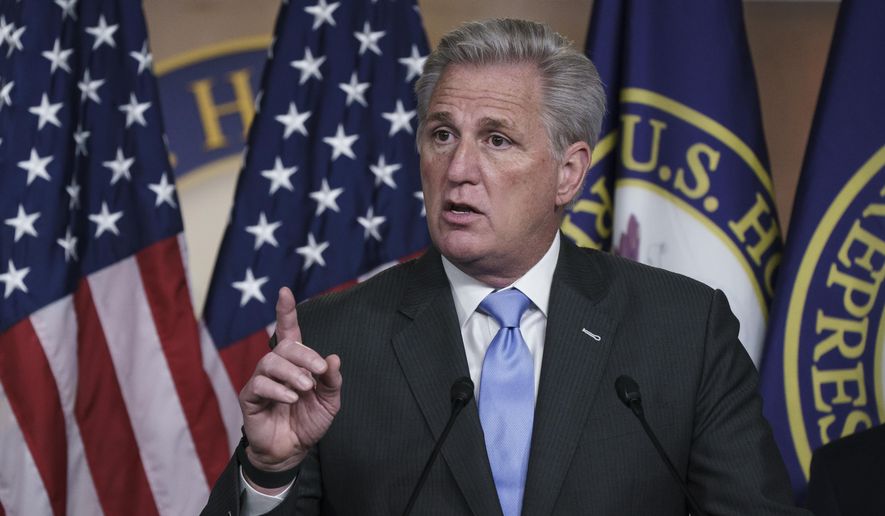NEWSMAKER INTERVIEW:
House Republicans are ready for a brutal fight in the next Congress and looking to use the thin Democratic majority as leverage, said Minority Leader Kevin McCarthy.
Mr. McCarthy, California Republican, and his team will use a strategy of coalition-building to effectively “run the floor” despite being in the usually powerless minority.
“They had a bigger majority last time. There were many times we could win the argument on the floor. Our ideas are stronger — and ours is about putting [together] a coalition,” he said in an interview with The Washington Times. “The only part of the Democratic conference that grew was the AOC side — more progressive, more socialist, so they’re going to divide. What you’re going to find is the Republicans united, Democrats divided.”
In a surprising turn of events on Election Day, Democrats lost several of their members in battleground districts while vulnerable Republicans survived.
Democrats are expected to have 222 members with the bare minimum votes needed to pass legislation at 218. That leaves House Speaker Nancy Pelosi only able to lose a handful of members on any given vote.
Her razor-thin majority will become even slimmer for a time, as at least three House Democrats have been tapped to join the Biden administration.
In response, Democrats are mulling a rule change to limit one of a minority’s most powerful procedural tools, what’s known in Washington-speak as a “motion to recommit.” It allows the minority party a chance to force at least one vote on an amendment of their choice, which is often used to score political points.
The majority party usually can fend off a motion to recommit, but Republicans successfully chipped off enough Democratic centrists in the current Congress to pass eight of their amendments — each one putting vulnerable Democrats in a predicament.
In a 2019 bill that required Customs and Border Protection to enact new safety and hygiene standards for undocumented immigrants in custody, Mr. McCarthy’s Republicans succeeded in attaching an amendment commending the U.S. Border Patrol for their handling of the migrant surge at the border.
Mr. McCarthy said changing the rules for these eleventh-hour amendments would fundamentally change the balance of power in the lower chamber and raise serious legal questions.
“If that is the only amendment that the minority has, they are now saying that their vote is more powerful than someone else’s vote. That the threshold for the minorities to ever win an amendment has to be higher than a simple majority of theirs. That, just in my view, is unconstitutional,” he said. “This just goes to show how weak their ideas are that they want to change a system … This will be a drag-out fight that we will never forget.”
House Majority Leader Steny H. Hoyer, however, argued Republicans didn’t vote for any similar motions while they were in the majority and are simply trying to protect a “spurious action.”
“A motion to recommit is a legitimate motion if in fact what you want to do is refer the bill back to committee for further consideration,” the Maryland Democrat said last month. “But what both sides have done is design ’gotcha amendments.’”
And yet, Mr. McCarthy said he was optimistic that there could be more bipartisan cooperation, particularly with those Democrats uncomfortable with the far-left approach pursued by Rep. Alexandria Ocasio-Cortez.
The New York congresswoman’s “Squad” is expanding, as several other more liberal, younger Democrats took over slots held previously by more establishment members. With the Congressional Progressive Caucus remaining one of the largest groups in the House, its members are trying to balance party unity with their quest to steer the agenda.
“Just that little socialist group can determine that Democrats can’t bring something to the floor. So it’s natural for if there are any common-sense Democrats that would join with Republicans, that we’d be able to pass, better legislation,” Mr. McCarthy said.
With their sights set on retaking the House in 2022, Republicans will be continuing to champion their “Commitment to America” agenda, which includes rebuilding the economy with a focus on small businesses, supporting law enforcement, reforming the Veterans Affairs Department and shoring up more resources for schools and school choice policies.
Mr. McCarthy said he could see House GOP willing to work on issues such as infrastructure or tackling the national debt with the incoming Biden administration. But he is more concerned about influence from the far-left of the Democratic Party.
“If they continue along the lines of socialist ideas that they talked about, I don’t think that’ll be productive at all,” he said.
• Gabriella Muñoz can be reached at gmunoz@washingtontimes.com.




Please read our comment policy before commenting.